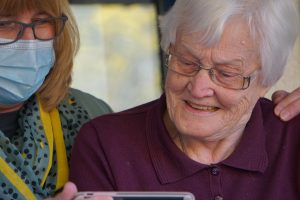Nursing Home Abuse Lawyer Burbank
To place a loved one in an assisted living facility or nursing home is a heart breaking decision. However, millions of families are forced to do so when their loved one’s medical needs and day to day care becomes challenging. We chose a facility where we believe our loved one will be provided with the same standard of care that we have provided but unfortunately that is often not the case. In fact, nursing home and assisted living abuse and neglect is becoming an epidemic in the United states. What is actually happening behind the closed doors of some facilities is horrifying.
If you discover nursing home abuse or neglect it can be devastating to you and your family. No nursing home resident should face abuse of any kind. Whether it is emotional or physical, mistreatment to the elderly is unacceptable.
Unfortunately, many cases of nursing home abuse go unreported. Statistics indicate that one in ten elders may experience some type of neglect or exploitation. It is essential that you contact a nursing home abuse lawyer in Burbank if you suspect that your loved one is at risk.

Lawyer for Nursing Home Neglect in Burbank, CA
Nursing home abuse is a sad reality in the California area. The elderly are society’s most common vulnerable targets for mistreatment and neglect. Elder abuse can stem from a spouse, family member, personal acquaintance, or a professionals in a positions of trust,such as a nursing home facility.
Yarian Accident & Injury Lawyers, APC has a team of experienced nursing home abuse attorneys. We have handled many nursing home abuse and neglect cases. Our attorneys have secured millions of dollars in settlements for our personal injury clients. Yarian Accident & Injury Lawyers, APC accepts clients in the greater Los Angeles County and Tulare County area and adjoining cities such as Long Beach, Los Angeles, Pasadena, Burbank, and Visalia.
The attorneys at Yarian Accident & Injury Lawyers, APC want to help you protect your rights. Call (818) 459-4999 or submit an online contact form today.
Overview of Nursing Home Abuse in California
Nursing Home Abuse Statistics
Nursing home abuse is a prevalent risk across the United States. The Centers for Disease Control and Prevention released a report of nursing home abuse statistics including:
- From 1991 – 2001, almost one-third of all nursing home facilities were cited for violations of federal standards that could cause harm, or that did harm elderly residents of those facilities;
- Nearly 10% of those home had violations that posed a risk of serious injury or death, or that did cause deaths of elderly residents;
- More than 40% of nursing home residents have reported abuse, and more than 90% report that they or another resident of the facility have been neglected;
- Research from 2010 indicates that up to half of all nursing home attendants have admitted to abusing or neglecting elderly patients;
More than half of all Certified Nursing Assistants (CAN’s) in elder care facilities have admitted verbally abusing, yelling, or using foul language with elderly residents of care facilities
Physical Abuse of the Elderly
Physical elder abuse is the non-accidental use of physical force against an elderly individual. It may result in pain or impairment, or even death. Signs of physical abuse can be subtle or overt. Physical abuse can range from improper use of drugs to the unnecessary use of physical restraints.
Some common subtle abuse can be consistent grabbing, pinching, pushing or arm-twisting. More overt abuse can be punching and kicking. Sexual abuse can also occur in a nursing home. Either type can leave the victim with lasting damaging effects.
If an elderly resident has sores or bruising around their wrists and ankles, they may have been physically restrained. Negligent nursing homes sometimes use physical or chemical restraint for residents with severe dementia or Alzheimer’s.
Lastly, elder abuse can include malnutrition and dehydration. Nursing homes are required to have a dietician and chef that tailor to their resident’s needs. Often, however, nursing homes are understaffed without enough supplies for everyone.
A negligent nursing home may fail to monitor a resident’s daily eating and drinking. In some abusive elder abuse cases, food is withheld as a punishment. Regardless of the situation, this kind of abuse is unacceptable.
Signs that physical abuse may be happening include:
- Malnutrition, dehydration, and sudden weight loss
- Unexplained injuries and recurring injuries
- Medical staff refused to leave a patient alone with the family
- Physical signs of restraint such as bruises and abrasions
- Bed Sores
Other actions may include but are not limited to:
• Taunting
• Manipulation
• Scaring
• Humiliation
• Yelling
• Antagonizing
• Belittling
• Insulting
• Patronizing
• Dismissiveness
• Pestering
• Passive aggressiveness
• Name-calling or using derogatory “pet names”
What is Considered Neglect?
Neglect is usually determined by the amount of attention that is paid to the person or thing. Nursing home neglect can exist when the facility and nursing home workers fail to provide the proper care necessary for residents. Although nursing home abuse can be seen on the same level or considered to be even worse, nursing home neglect can have similar gruesome long-term effects. When the resident is uncared for, it can lead to worsening conditions, especially if the resident is already suffering from a serious disease or illness. Neglect of a patient can also lead to the patient feeling unwanted and rejected.
Nursing home staff handle every aspect of a resident’s life for them. Some of the neglectful actions that can take place include:
- Poor Maintenance/Living Conditions – Part of the reason residents and elderly people are living in a nursing home with assisted living is because they are not able to keep up with certain work by themselves. Nurses are responsible for cleaning the resident’s room, changing bed sheets, and doing laundry. Poor maintenance and living conditions can hinder a resident’s environment and affect their mental health.
- Lack of Hygiene – residents need assistance to take a shower and to put on clothes. If a resident is not showering regularly, they can start to feel dirty and have a bad self-image. Because there is not much life outside of the nursing home, a good hygiene can be part of what keeps individuals feeling like normal and keep a positive outlook on their lives. On the other hand, poor hygiene may also be problematic for some residents who are prone to infections or viruses.
- Malnutrition – Residents should have scheduled meals each day. If residents skip meals or are fed poor food choices, their physical well-being is compromised. Residents, like those with diabetes or heart disease, who are on strict diets, must be fed certain types of foods and maintain certain glucose levels in order to prevent any worsening conditions.
- Isolation – No one likes to feel isolated, especially residents of a nursing home. Nursing homes are meant to be interactive places where residents can interact with each other and participate in daily activities. When residents are secluded and isolated, this can impact their mental health severely. Especially if visitors aren’t frequent, residents can end up feeling depressed and sick. Residents should always be included in activities and allowed to interact with others daily. Nurses should also be chatting with residents daily to keep up with the resident’s social skills and be updated on the resident’s needs.
- Improper care – Certain residents may have certain illnesses or conditions that require extra care. Residents who must take medications or need insulin doses daily require an extra level of attention. If the staff at the nursing facility fail to administer medication or even give the wrong dose, a resident can fall critically ill, up to death.
Signs Your Loved One Is Being Neglected
Knowing if your loved one is being neglected can be very difficult, because nursing homes are generally closed off from the rest of the public. However, even if the resident or individual has limited communication abilities, there are noticeable signs that one can keep up with such as the following:
- Poor hygiene: If you can tell your loved one hasn’t showered in a while or their appearance seems unkept, the staff may be neglecting the resident’s hygiene.
- Poor living conditions: If you are visiting your loved one and their room appears messy or untidy, then that may be a sign of the nursing home staff not dedicating enough time to your loved one or their environment.
- Physical signs of lack of nutrition: A clear sign of lack nutrition is a resident that has lost extensive weight. If the resident is unfed or fed the wrong foods, their physical health may already be suffering. Their health measurements such as blood sugars or blood pressure may not be doing as well as before.
- Loss or lack of mobility- If a resident is not taken out to walk or perform some movement outside of their bed, their body may be suffering. A loss or lack of mobility may be a sign of the lack of exercise.
- Unexplained injuries – If a resident spends too much time on their bed, they can develop bed sores, which can impact their physical mobility. Similarly, if a resident’s needs aren’t being met, he or she may attempt to reach for things on their own and can end up falling or worse. Any bruise, cut, strain, or fracture can be a sign of serious lack of attention to the resident.
- Psychological Issues – If the resident is being ignored or secluded, this can cause them to enter a depressive state. A clear sign of this may be in the resident’s change in outlook on life or signs of suicidal thoughts.
- Limited social skills – The resident may not be as social as before or may appear to have worsening social skills. If the resident is not encouraged to talk or be social, their social skills start diminishing.
- Physical signs of distress – If a person appears to be stressed or in severe pain, their physical appearance will most likely show it. The person’s appearance may show lack of sleep. He or she may not be acting as usual and look down or sigh a lot.
- Lack of Information from Staff – A clear sign of lack of attention may be in the way the staff communicates with you. If their information about the resident is very limited or non-existent, they may not be keeping up with the resident’s behavior or state of being at all.
Nursing Home Falls
Falls account for nearly 30 percent of injury deaths among senior citizens. Even seemingly mild falls can result in permanent injury or death. A fall is nearly always the result of negligence or understaffing. An unattended fallen resident can face great emotional and physical damages.
When a resident moves into a nursing home, the facility is required to design a care plan that includes a fall risk assessment. A fall risk assessment is to see what assistance the resident may need to safely move around. A facility that does not plan ahead for a fall is being negligent.
Often, falls in nursing homes are caused by the facility’s carelessness. Structural factors can impact fall risks such as poor lighting, wet floors, poorly fitted wheelchairs or improper bed height. A nursing home that fails to maintain its premises is also being negligent.
Most falls can be prevented, with or without the use of restraints such as bed rails. Restraints are typically a last resort. Supervision and care by staff should be enough to prevent any future falls. Studies have shown that limiting a person’s mobility can contribute to fall-related injuries.
Walking and physical conditioning programs, lowered bed heights, raised toilet seats and avoiding clutter can all help prevent falls. Additionally, facilities should ensure there is adequate staff available to assist residents with getting around.
Bedsores in Long-Term Care Facilities
Bedsores, also known as pressure ulcers, are all too common in nursing homes. The vast majority of bedsores are the result of inattentive care that could have been prevented. Bedsores can be incredibly painful. They can cause disability and greatly increases the resident’s risk of complications like sepsis or gangrene.
Some very basic preventive measures have been proven to protect residents from this type of injury. Residents should be turned at regular intervals to keep them clean and dry. Any resident should be well hydrated and properly nourished. Lastly, a resident should be able to utilize the latest technological advances in cushions and mattresses.
Emotional Abuse of the Elderly
Most nursing home residents are unidentified victims of emotional elder abuse. Such abuse may include verbal abuse or passive behaviors such as ignoring or isolating the elderly resident. Any kind of emotional abuse can leave elderly residents in states of pain, distress, anxiety or fear.
Some elderly patients have cognitive disorders that create an increased dependency on caretakers. A high-quality staff must entail emotional and physical support. If a patient with a cognitive disorder is ignored, it can trigger coinciding physical symptoms.
Left unchecked, emotional abuse can create lasting mental and physical effects to the resident’s overall health. Signs of elder emotional abuse can include:
- Avoids eye contact
- Sudden mood swings
- Prevented from acting or making their own decisions
- Not allowed to join in social interactions
- May be prevented from seeing other people or calling other people
- Low self-esteem
- Doesn’t speak openly
- May display a desire to hurt their own self or another
- Often seems hopeless, disturbed, or scared
Financial Abuse of the Elderly
Financial exploitation is another common form of elder abuse. Abusers may use their position of authority to extort money. While it is often perpetrated by family members or others known to the victim, it also comes at the hands of professional caregivers.
Elderly care facility residents have reported financial abuse in the form of coercion to revise wills, trusts, or deeds to compensate caregivers. An elderly resident may be robbed of personal property or be forced to withdraw cash or take loans for proceeds made by caregivers.
The most common types of financial exploitation include:
- Embezzlement or theft
- Home repair and contractor scams
- Forgery of signature
- Deceiving or forcing the changing of deeds, wills, and power of attorney
- Internet and telemarketing scams
- Exploitation of investments
- Fraud
- Coerced transfer of property and assets
- Improper use of the power of attorney
- Use of funds without knowledge or permission
Wrongful Death under California Court
Wrongful death works like a personal injury lawsuit, in which an individual or entity’s reckless or negligent action can lead to the victim’s injuries or death. Under California law, you must file a lawsuit for wrongful death case within two years of the date of the death.
Only certain individuals can file for a wrongful death suit on behalf of the victim. The individuals allowed to recover include the deceased’s spouse, children under 21, and other individuals who were legally supported by the deceased. The damages allowed to recover can include funeral and burial costs, pain and suffering, and in some circumstances, punitive damages.
Talk to an Experienced Nursing Home Abuse Lawyer

If you or a loved one has suffered injury due to nursing home abuse or neglect, contact an experienced elder abuse attorney to discuss your situation. The nursing home abuse lawyers in Burbank attend to each case with care and passion.
Families and victims of nursing home neglect should not be burdened with legalities. Let Yarian Accident & Injury Lawyers, APC guide you through these complex issues. You and your family may be entitled to compensation. Our attorneys, with extensive personal injury experience, practice throughout California and surrounding areas including Long Beach, Los Angeles, Visalia, Burbank, and Pasadena.
Our personal injury attorneys will not charge for their services unless and until they successfully settle or prosecute your case. Call (818) 459-4999 today to schedule a free consultation.
Yarian Accident & Injury Lawyers Burbank Office
500 E Olive Ave Suite 720,
Burbank, CA 91501
(818) 459-4999
Nursing Home Stats | Center for Disease Control and Prevention (CDC) – The CDC provides information about nursing homes inside the United States. The data it provides includes the types of services offered in nursing homes and the service providers.
Nursing Home Rating | Centers for Medicare and Medicaid Services (CMS) – The CMS office has implemented a point system to rate nursing homes across states. The point system is designed to help families compare options between nursing homes and prioritize what’s important to them.
Nursing Home Abuse Statistics – Visit the website for Nursing Home Abuse (NHA.org), whose mission is to gives information regarding nursing home abuse, lawsuits, neglect, and national laws. Read about nursing home abuse stories, and nursing home abuse facts in modern news.
Elderly Abuse Statistics and Data – Visit the National Center on Elder Abuse (NCEA), a national resource center dedicated to the prevention of elder mistreatment. See research from the NCEA Research Advisory Group that details the elderly population, prevalence, risk factors, and types of abuse. See how to report a nursing home to the state, what are some California nursing home violation, and a link to the elder abuse complaint form.
Elder Abuse – Visit the California Department of Justice for Elder Abuse and the Bureau of Medi-Cal Fraud & Elder Abuse (BMFEA) on statistics for elderly abuse. Read more on California’s preventive programs, state nursing home inspections, and how the bureau prosecutes elder abuse.









